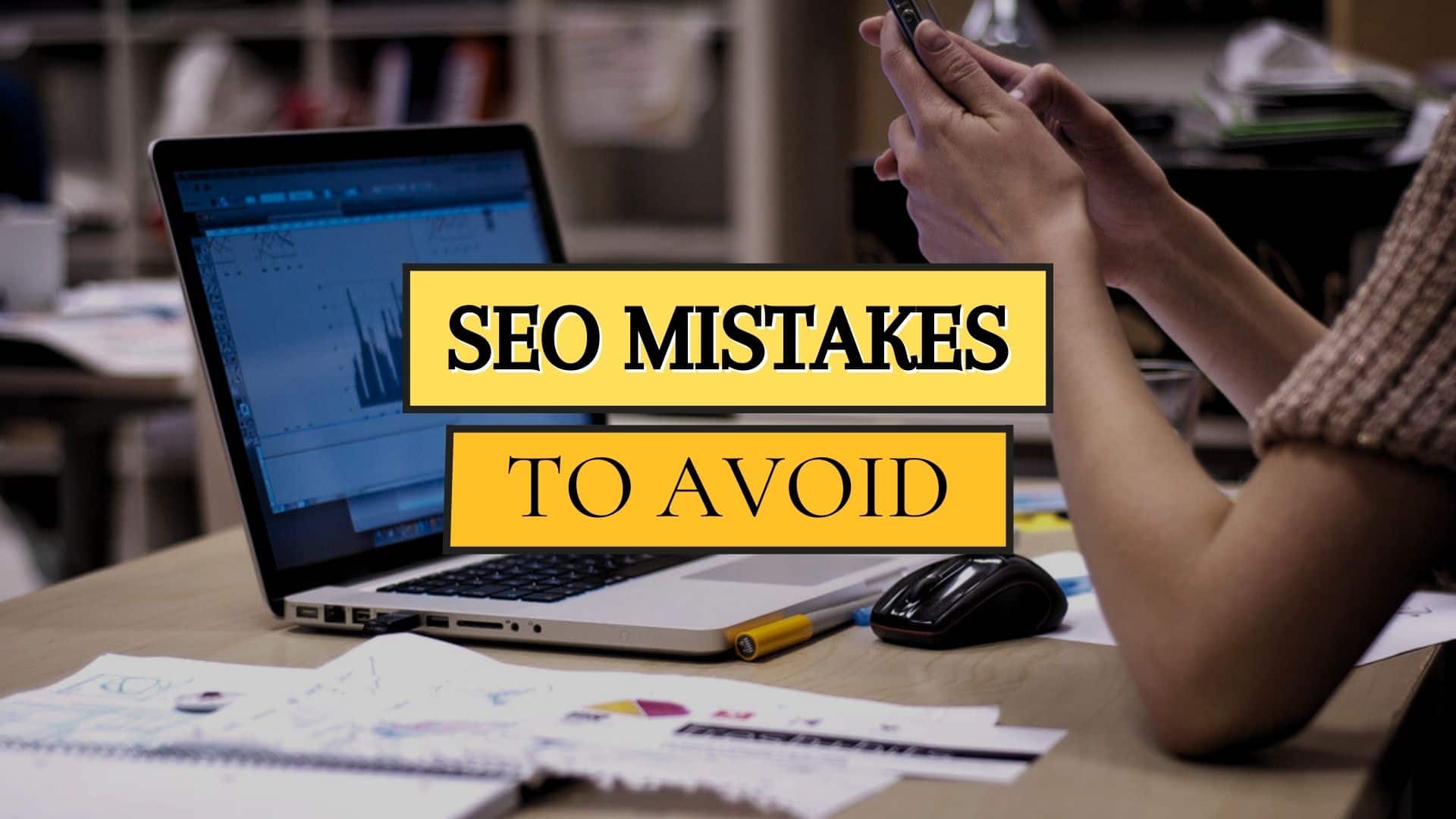SEO isn’t just about keywords, rankings, and traffic. It’s really about building a website that both search engines understand and people enjoy using. Even the best websites can struggle to rank if they make a few common SEO mistakes.
Things like choosing the wrong keywords, having slow pages, or not optimizing for mobile can hurt your site’s performance and stop you from reaching your goals.
In this guide, we’ll look at the 10 most common SEO mistakes and show you how to fix each one. Whether you’re running a blog, an online store, or a business website, avoiding these mistakes will help you show up higher on Google and attract the right audience.
Key Takeaways
- Match your content to what people are actually searching for — whether they want information, a product, or a service.
- Check your website regularly for issues like broken links, slow pages, or missing content.
- Make sure your site looks and works great on mobile since Google prioritizes mobile-friendly websites.
- Write naturally — avoid repeating the same keyword too many times.
- Get backlinks from trusted and relevant websites to boost your credibility.
- Keep old content fresh with regular updates to stay relevant and attract new visitors.
- Use tools like Google Analytics 4 and Google Search Console to track your performance and find areas for improvement.
- Show your experience, expertise, authority, and trustworthiness (E-E-A-T) in your content to meet Google’s quality standards.
What Are the Most Common SEO Mistakes Businesses Make?
Some of the biggest SEO mistakes include ignoring search intent, stuffing keywords, skipping technical SEO, and forgetting mobile optimization. Regular website audits, fresh content, and performance tracking with tools like Google Analytics and Search Console can help you avoid these issues.

Many businesses struggle simply because they focus on the wrong things or fail to keep up with changing SEO trends.
The 10 Most Common SEO Mistakes (and How to Fix Them)
Let’s go through each mistake step-by-step — what causes it, why it’s a problem, and how you can fix it.
Mistake #1: Ignoring Search Intent
Why it’s a problem:
Search intent is what someone really wants when they type a query into Google. Are they looking for information, ready to buy something, or trying to find a specific website?
If your content doesn’t match their intent, it won’t rank well.
How to fix it:
Use tools like Google Search Console and Semrush to understand what users are looking for. Then, create content that answers their questions or solves their problems.
Mistake #2: Overlooking Technical SEO
Why it’s a problem:
If your site has technical issues — like slow speed, broken links, or missing sitemaps — Google might struggle to read and rank your pages.
How to fix it:
Run regular technical audits with tools like Ahrefs or Screaming Frog. Fix errors, improve page speed, and make sure your site is mobile-friendly and easy for Google to crawl.
Also Read: 5 Proven SEO Techniques That Will Boost Your Rankings
Mistake #3: Not Optimizing for Mobile
Why it’s a problem:
Over 60% of searches happen on phones. If your website isn’t mobile-friendly, you’re losing visitors — and Google rankings.
How to fix it:
Test your site using Google’s Mobile-Friendly Test and PageSpeed Insights. Make sure it loads quickly and looks good on all screen sizes.
Mistake #4: Keyword Stuffing
Why it’s a problem:
Repeating the same keyword too often makes your content sound robotic and spammy. Google can detect this and may lower your ranking.

How to fix it:
Write naturally. Use related terms and focus on making your content helpful and easy to read.
Mistake #5: Low-Quality or Shallow Content
Why it’s a problem:
Thin or unhelpful content doesn’t perform well because Google wants to show users valuable, in-depth information.
How to fix it:
Create detailed, helpful content that answers your audience’s questions. Add examples, expert insights, and real data to make it more engaging.
Mistake #6: Weak Internal Linking
Why it’s a problem:
If your pages aren’t properly linked, Google might miss some of them, and users might not find related content easily.
How to fix it:
Add internal links to related pages. Use clear, descriptive anchor text so both readers and Google know what the link is about.
Mistake #7: Not Using Analytics or Data
Why it’s a problem:
If you’re not checking your data, you won’t know what’s working or what’s not. That means you could be wasting time on the wrong strategies.
How to fix it:
Use Google Analytics 4 and Google Search Console to track performance. Look at things like traffic, top pages, and which keywords are driving results.
Mistake #8: Ignoring Local SEO
Why it’s a problem:
If your business serves a specific area and you skip local SEO, you’ll miss out on potential customers searching nearby.

How to fix it:
Claim and optimize your Google My Business (GMB) profile. Keep your Name, Address, and Phone Number (NAP) consistent across platforms, use local keywords, and get backlinks from local websites.
Mistake #9: Neglecting Backlinks
Why it’s a problem:
Backlinks — links from other websites to yours — help Google see your site as trustworthy. Poor-quality or spammy links can actually hurt your SEO.
How to fix it:
Build high-quality backlinks through guest blogging, partnerships, or digital PR. Use tools like Ahrefs to find and remove bad backlinks.
Mistake #10: Not Updating Old Content
Why it’s a problem:
Outdated content can lose relevance and rank lower on Google.
How to fix it:
Update your old posts with new data, images, and insights. Repurpose older content into videos, infographics, or social posts to reach more people.
Also Read: The Ultimate Guide to SEO Keyword Research (Guide 2026)
Bonus Tip: Keep Testing and Improving
SEO changes all the time. What worked last year might not work now. Try new strategies every few months — like refreshing headlines, adding structured data, or improving your meta descriptions. Small tweaks can lead to big results.
Tracking and Measuring SEO Success
Once you’ve fixed these mistakes, keep an eye on your progress. Use analytics tools to track your rankings, traffic, and engagement. Regular audits help you stay on top of issues before they become bigger problems.
Real-World Case Studies
Case Study 1 — Real Estate Company in Dubai
Problem: The site had good content but wasn’t ranking well because Google couldn’t find all its pages.
Fix: They updated their sitemap and fixed technical errors. Within three months, their search traffic grew by 58%.
Case Study 2 — HatchTechs UAE Client
Problem: The site used outdated SEO tactics like keyword stuffing, making content hard to read.
Fix: They rewrote content naturally and improved readability, leading to 74% more traffic and a 30% lower bounce rate.
Case Study 3 — Global E-Commerce Brand
Problem: Outdated content wasn’t matching what users were searching for.
Fix: They updated 50+ blog posts with new keywords and visuals, resulting in a 40% increase in clicks.
Conclusion
SEO isn’t something you do once and forget — it’s an ongoing process. The mistakes we covered can hold you back, but once you fix them, your website will perform better and attract more visitors.
Here’s what to do next:
- Fix the SEO issues on your site.
- Track your website’s performance.
- Review your progress regularly.
Remember, SEO is all about consistency. Keep learning, improving, and adapting — and your results will keep growing.




